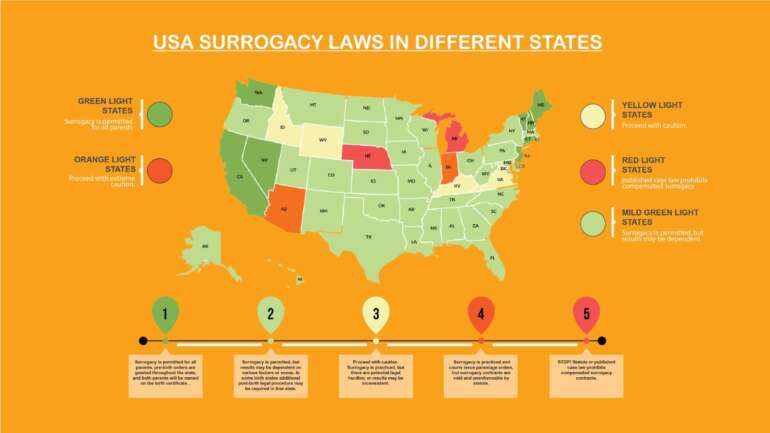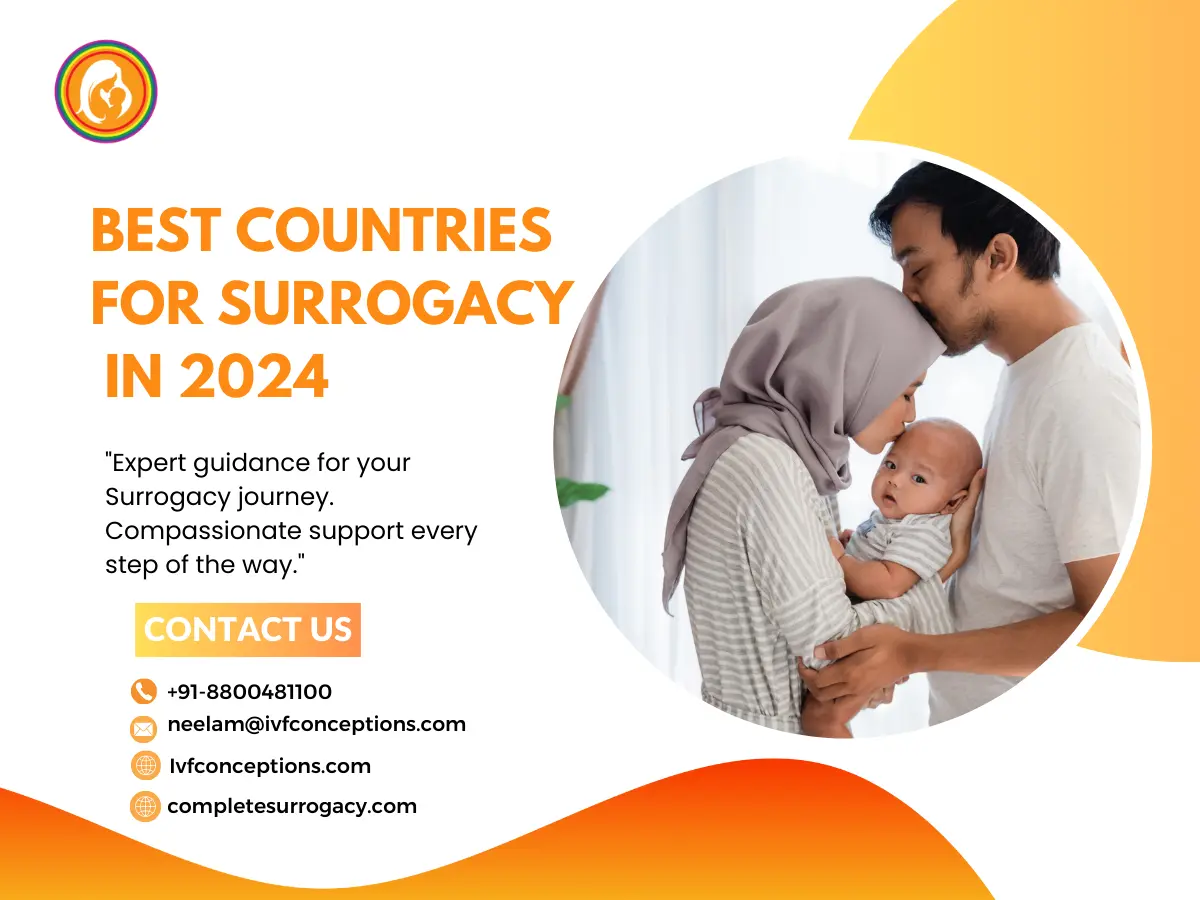Best Countries for Surrogacy in 2025: International Destinations, Costs, and Legal Considerations
Surrogacy has become an increasingly popular option for individuals and couples looking to grow their families. However, the legal landscape surrounding surrogacy can be complex and varies significantly across different countries. If you’re considering surrogacy, it’s crucial to research the best countries that offer favorable laws, affordable costs, and high-quality medical services. In this blog post, we’ll explore some of the top destinations for surrogacy in 2025 which are legal and secure.
- Book an online appointment: Get a free online consultation.
- Call\W:+91-8800481100 Email:neelam@ivfconceptions.com
Factors to consider when using an international surrogacy countries
When selecting an international surrogacy destination, understanding the legal framework is crucial. Countries like Ukraine, India, Mexico, Argentina, Colombia, Georgia, and the USA have explicit surrogacy laws, providing legal protection for intended parents and ensuring the citizenship and travel documentation of the baby.
Additional Guides for Surrogacy in Georgia
What are the Starting Steps for Surrogacy Process in Georgia?
How Much Does Surrogacy Cost in Georgia Country
Surrogacy for Hetero Couples in Georgia Europe
When selecting an international surrogacy destination, it’s important to consider the following factors:
- Surrogacy Laws country by country – Opt for a country with clear and favorable surrogacy laws that provide legal protections for all parties involved, including the intended parents and the surrogate.
- Surrogacy Cost – Evaluate the overall cost of surrogacy in the country, including medical expenses, legal fees, and surrogate compensation. Some countries offer more affordable options compared to others.
- Medical Facilities and Success Rates – Research the quality of medical facilities, expertise of healthcare professionals, and success rates for procedures like IVF and embryo transfer.
- Citizenship and Travel Requirements – Understand the process for obtaining citizenship and travel documents for the baby, as well as any specific requirements for the intended parents.
- Eligibility Criteria – Familiarize yourself with the country’s eligibility criteria for intended parents, such as marital status, sexual orientation, age limits, and genetic requirements.
- Cultural Considerations – Be mindful of cultural norms and attitudes towards surrogacy in the chosen country, as they may impact the overall experience.
- Language and Communication – Consider language barriers and availability of translation services, particularly when communicating with medical professionals and surrogates.
- Support Services – Look for countries with established surrogacy agencies or clinics that offer comprehensive support services, such as counseling and legal guidance.
- Exit Process – Understand the procedures and requirements for bringing the baby back to your home country after birth.

Surrogacy Laws of the country- Opt for surrogacy friendly country
Surrogacy by country for intended parents and surrogacy arrangements are allowed in some of the popular surrogacy destinations:
| Country | Regulation | Who is Allowed | Surrogacy Type |
|---|---|---|---|
| United States | Varies by state | Singles, Same-sex couples, Heterosexual couples | Gestational |
| Georgia | Commercial | Heterosexual married couples only | Gestational |
| Ukraine | Commercial | Heterosexual married couples only | Gestational |
| Colombia | Altruistic | All family types (Singles, Same-sex, Heterosexual) | Gestational |
| Mexico | Altruistic | All family types (Singles, Same-sex, Heterosexual) | Gestational |
| Greece | Altruistic | Heterosexual couples, Single women | Gestational |
| Canada | Altruistic | All family types | Gestational |
Notes:
- Commercial surrogacy means the surrogate is financially compensated beyond reimbursement of expenses.
- Altruistic surrogacy means the surrogate cannot be paid beyond reimbursement of approved expenses.
- Gestational surrogacy means the surrogate is not genetically related to the child, as an embryo is transferred to her uterus.
So countries like the US, Colombia, Mexico and Canada allow all types of intended parents, while Ukraine and Georgia only permit heterosexual married couples. The regulations also vary between allowing commercial compensated surrogacy or just altruistic arrangements.
Best countries for surrogacy
Country 1. United States of America ( Best Country for surrogacy)
United States of America – The Gold Standard for Surrogacy
The United States is widely regarded as the gold standard when it comes to surrogacy arrangements. With its state-by-state regulations, the country offers a patchwork of surrogacy-friendly laws that vary across different regions. While some states are more welcoming to surrogacy, others have stricter guidelines, providing intended parents with a range of options to explore.
One of the key strengths of pursuing surrogacy in the U.S. is the advanced medical facilities and cutting-edge assisted reproductive technologies (ART) available. The country boasts some of the highest success rates for in vitro fertilization (IVF) transfers, with a remarkable 75% to 85% success rate. Moreover, once a surrogate becomes pregnant, the chances of a successful pregnancy are an impressive 95%.
The U.S. stands out for its inclusivity, allowing all prospective parents, regardless of marital status or sexual orientation, to embark on the surrogacy journey. This openness extends to single males, single females, heterosexual couples, and same-sex couples, ensuring that the path to parenthood is accessible to a diverse range of individuals and families.
A critical component of the surrogacy process in the U.S. is the surrogacy agreement, a legally binding contract signed between the surrogate and the intended parents before the medical procedures begin. This agreement clearly outlines the roles, responsibilities, and expectations of both parties, providing a secure framework and peace of mind for all involved.
To further solidify the intended parents’ rights, the U.S. offers two pivotal orders: the pre-birth order and the post-birth order. The pre-birth order, also known as a declaration of parentage, is typically obtained during the third trimester and instructs the hospital to list the intended parents’ names on the child’s birth certificate. This order ensures that the surrogate’s name is not included on the birth certificate unless explicitly requested by the intended parents.
In states where pre-birth orders are not permitted, the post-birth order serves a similar purpose, determining the legal parentage of the child based on the surrogacy agreement after the baby’s birth.
While the U.S. is considered the gold standard for surrogacy, it is important to note that the process can be financially demanding. The approximate cost of surrogacy in the U.S. ranges from $150,000 to $200,000, making it a significant investment for many intended parents. This high cost is influenced by various factors, including egg donation, the state where the surrogacy takes place, the number of IVF attempts required, additional techniques like preimplantation genetic testing (PGS/PGD), agency fees, surrogate compensation, medical insurance coverage for the surrogate, and travel expenses during the pregnancy.
Despite the substantial financial commitment, the U.S. offers a comprehensive legal framework, advanced medical facilities, and inclusive policies, making it a top choice for many intended parents seeking to build their families through surrogacy.
Country 2. Georgia ( Best Country for surrogacy)
Legalizing surrogacy since 1977, Georgia holds a unique stance compared to other nations in Eastern Europe. Specifically, Georgian surrogacy laws restrict the practice solely to married heterosexual couples, effectively barring participation from unmarried individuals and same-sex couples.
Under Article 143 of Georgian law, extracorporeal fertilization is permitted, extending eligibility to women without a uterus, as well as those facing medical challenges preventing successful pregnancy, such as Mullerian duct anomalies.
Article 144 outlines the legal framework for surrogacy arrangements in Georgia, also allowing for sperm and egg donation, with the option to keep donor identities confidential if desired by the intended parents.
Upon the child’s birth, intended parents assume legal parenthood, reflected in the issuance of the birth certificate within 1-3 days post-delivery. Surrogates relinquish any parental rights, bypassing the need for adoption proceedings.
Costs for surrogacy in Georgia typically range between $50,000 to $60,000, with variations depending on factors such as additional procedures like sperm or egg donation, and the necessity for multiple IVF attempts. Some clinics offer comprehensive packages, including genetic testing, at an additional cost.
Benefits of pursuing surrogacy in Georgia include well-defined legal regulations, a robust pool of donors and surrogates, quality medical services, and favorable connectivity with other countries. Moreover, the absence of visa requirements in most European nations further streamlines the process.
However, a notable disadvantage lies in Georgia’s restriction on single men and same-sex couples from engaging in surrogacy. Despite this limitation, the increasing number of international intended parents choosing Georgia for surrogacy underscores the importance of maintaining high standards among IVF clinics and surrogacy agencies in the region.
.
Country 3. Colombia ( Best Country for surrogacy)
Colombia has become an attractive surrogacy destination for single individuals and same-sex couples seeking to grow their families. The country’s constitution protects equal rights for foreigners, and surrogacy is legally available to all family types, as long as there is a genetic link between the intended parent(s) and the child. The cost of surrogacy in Colombia is approximately $65,000, making it a more affordable option compared to the U.S.
Surrogacy in Colombia: A Summary
- Legal Framework
- Colombian tribunal upholds surrogacy rights.
- Assisted reproduction is protected by the Colombian constitution.
- Same-sex couples and single parents have access to surrogacy and ART techniques.
- Eligibility
- Anyone with a genetic link to the child can pursue surrogacy.
- Foreigners have equal rights under Article 100 of the Colombian Constitution.
- Cost
- Surrogacy in Colombia costs $65,000 for a fully inclusive guaranteed birth.
- This is significantly cheaper than the USA.
- Benefits
- Lowest cost for gay surrogacy compared to other countries like Mexico and Argentina.
- Guarantee baby program available for $65,900.
- Good medical facilities with high IVF success rates.
- Safe and secure environment for LGBT surrogacy.
- Large database of egg donors.
- Established track record with over 1000 successful surrogacy journeys.
- Disadvantages
- Risk of Zika Virus in South America, although Bogota is considered low-risk.
- Surrogacy in Colombia is relatively new, starting in early 2019.
- Recommendations
- Opt for a guaranteed baby plan for added security.
- Colombia is the most affordable option for gay couples seeking surrogacy.
More Resources to Read:
Guaranteed Surrogacy in Georgia
How Does Gestational Surrogacy Work in Georgia? Step-by-step Guidance
Surrogate Mother Cost in Georgia
Country 4. Mexico ( Best Country for surrogacy)
Mexico has recently emerged as a surrogacy-friendly country, allowing all family types, including single parents, same-sex couples, and unmarried heterosexual couples, to pursue surrogacy. The cost of surrogacy in Mexico ranges from $68,000 to $70,000 for a guaranteed baby program, offering a more affordable alternative to the U.S. while still providing legal protections and quality medical care.
Surrogacy in Mexico: Affordable and Inclusive Options
- Cost
- Surrogacy programs in Mexico offer a guaranteed baby plan for $68,000.
- All-Inclusive Guaranteed Egg Donor Surrogacy is priced at $68,900.
- Experience
- Our team in Mexico City boasts over 13 years of experience in global surrogacy services.
- Legal Developments
- A 2021 Supreme Court decision has made surrogacy in Mexico a top choice globally for singles and couples of all sexual orientations.
- Learn more about gay surrogacy in Mexico.
- Inclusivity
- Surrogacy in Mexico is open to all intended parents, including:
- Gay couples
- Single males and females
- Unmarried heterosexual couples
- Married heterosexual couples
- Surrogacy in Mexico is open to all intended parents, including:
- Benefits
- Significant cost savings compared to the USA, with up to 70% savings through our guaranteed baby plan.
- Assured plan program available for $67,000, offering affordability and legal security.
- Access to good medical facilities with high success rates.
- Legally viable for same-sex couples.
- Extensive database of egg donors and no waiting list for surrogate mothers.
- Conclusion
- Mexico emerges as one of the best countries for surrogacy, catering to all family types and especially preferred for gay surrogacy.

Country 5. Argentina ( Best Country for surrogacy)
Surrogacy in Argentina: Detailed Insights
Legal aspect for surrogacy in Argentina:
- Argentina lacks specific legislation addressing surrogacy, leading to legal ambiguity and uncertainty.
- Some judicial decisions have granted parental rights to intended parents in cases where a genetic link exists between at least one intended parent and the child.
- However, the lack of comprehensive legal framework poses challenges and risks for both intended parents and surrogates.
- Legal advice is crucial for individuals considering surrogacy in Argentina to navigate the complex legal landscape and mitigate potential legal issues.
Surrogacy Cost in Argentina:
- The cost of surrogacy in Argentina varies widely and depends on factors such as medical expenses, legal fees, and agency charges.
- While Argentina may offer relatively lower costs compared to countries like the USA, the lack of regulation and legal uncertainty may contribute to unpredictability in expenses.
- Intended parents should budget for medical procedures, legal consultations, surrogate compensation, and other associated costs when considering surrogacy in Argentina.
Surrogacy Process in Argentina:
- The surrogacy process in Argentina typically involves several steps, including:
- Initial consultations with medical professionals and legal experts to understand the legal and medical aspects of surrogacy.
- Finding a suitable surrogate, which may involve working with surrogacy agencies or independent arrangements.
- Undergoing medical procedures such as IVF (In Vitro Fertilization) to create embryos using the intended parents’ genetic material.
- Implanting the embryos into the surrogate’s uterus, followed by monitoring and support throughout the pregnancy.
- Legal procedures to establish parental rights and responsibilities, which may vary depending on judicial decisions and individual circumstances.
Considerations:
- Intended parents should carefully consider the legal and ethical implications of pursuing surrogacy in Argentina.
- Due diligence is necessary to ensure the safety and well-being of all parties involved, including the surrogate and the future child.
- Consulting with experienced professionals, including legal experts, medical professionals, and surrogacy agencies, can help navigate the surrogacy process and address potential challenges.
- It’s essential to stay informed about any changes in legislation or judicial rulings that may impact the legality and accessibility of surrogacy in Argentina.
Conclusion
When considering surrogacy in any country, it’s essential to research the specific legal requirements, success rates, medical facilities, and potential restrictions based on your individual circumstances. Additionally, it’s advisable to work with reputable surrogacy agencies or clinics that can guide you through the process and ensure a smooth and legally secure journey.
Remember, the decision to pursue surrogacy is a deeply personal one, and the best country for your surrogacy journey will depend on your unique needs, preferences, and financial considerations. By doing thorough research and seeking professional guidance, you can increase your chances of a successful and fulfilling surrogacy experience.
Selecting the best country for surrogacy involves careful consideration of legal, financial, and logistical factors. By exploring the options available and seeking guidance from experienced professionals, intended parents can make informed decisions on their surrogacy journey.
If you’d like to learn more about IVF, Egg Donation, or surrogacy services globally, check out the rest of our website at Georgia Surrogacy Agency. We offer legally secure and affordable surrogacy consulting services for FREE.
Our team has over 14 years of experience facilitating surrogacy arrangements, egg donation, and serving as an advocacy resource for infertile couples and LGBTQ individuals seeking to build families.
For more resources on IVF and Surrogacy, browse our other web page- IVF Conceptions.
For more resources on IVF and Surrogacy, browse our other web page- Complete Surrogacy.
More reference:
https://www.aljazeera.com/features/2023/9/6/georgia-plans-to-ban-commercial-surrogacy
https://ge.usembassy.gov/message-for-u-s-citizens-new-law-banning-surrogacy-planned-in-georgia/
Frequently Asked Questions for best countries for surrogacy in 2024
Q: What are the legal requirements for surrogacy in different countries?
A: The legal requirements for surrogacy vary from country to country. While some nations, like Ukraine and Georgia, allow commercial surrogacy for married heterosexual couples, others, like Colombia and Mexico, offer more inclusive policies, permitting surrogacy for all family types, including single individuals and same-sex couples.
Q: How much does surrogacy cost in different countries?
A: Surrogacy costs can range from $50,000 to $200,000, depending on the country and the specific services offered. While countries like the USA may offer advanced medical technology and higher success rates, destinations like Ukraine and Georgia provide more affordable options without compromising on quality or legal protections.
Q: What are the success rates of surrogacy in various destinations?
A: Surrogacy success rates can vary based on factors such as the quality of medical facilities, the expertise of medical professionals, and the health of the surrogate mother. It’s advisable to consult with reputable surrogacy agencies or clinics for up-to-date success rate information tailored to your specific case.

Highly esteemed, authoritative, and trusted professional with a 14-year of experience in international surrogacy. Advocate for Secure, Legal, and Affordable International Surrogacy.
Neelam Chhagani, MA (Counselling Psychology) and Holistic Infertility and Third-Party Reproduction Consultant.
Member of European Fertility Society, Best Surrogacy Blogger of 2020, with 300 dedicated blogs, and top contributor on Quora for Surrogacy.


Add Your Comment